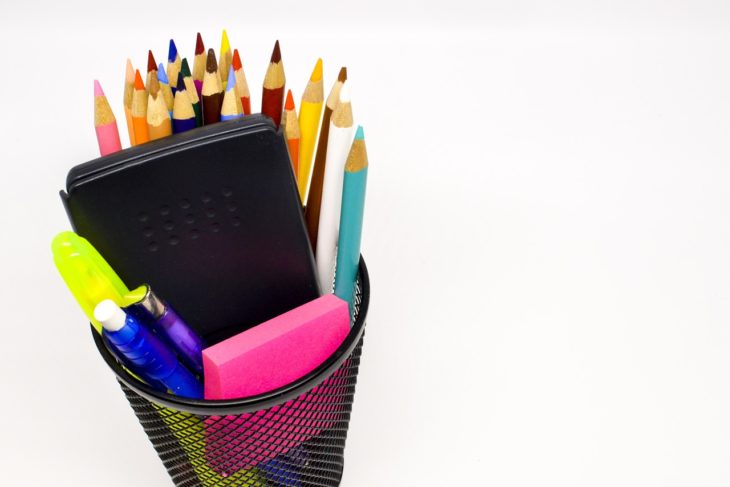PRESCHOOL
- Purchase extra-cushy nap mats.
- Visit the preschool a few times before the big day, or plan a play date with a child to foster friendships.
- Read books about preschool. Some recommendations are “The Night Before Preschool” by Natasha Wing and “The Kissing Hand” by Audrey Penn.
ELEMENTARY SCHOOL
- Read every day for at least 20 minutes a day.
- Schedule summer library visits and routine story times.
- Take first/last day of school pictures.
- Find out about themed days and buy items throughout the year on sale. There are so many themed days (Dr. Seuss Day, Red Ribbon Week, Career Day, Picture Day, etc.) and no time to shop.
- Knock out reading fair and science fair projects over the summer when your child actually can enjoy it and have more time. It’s really chaotic to complete during the year with everything else going on.
MIDDLE SCHOOL
- Find out about clubs and extra-curriculars. Encourage your child to try a new activity.
- Middle-schoolers don’t like to do things that are unfamiliar. Implement a “thee strikes, you’re out” rule. Your child will try (insert activity), and if they still don’t like it by the third time, they do not have to participate again.
- Encourage more responsibility. Give child a budget for school supplies and let them do the shopping. Have them pack their own lunches and put them in charge of their own laundry.
- Those tough (and not-so-comfortable) conversations are inevitable at this age. We need to have discussions about puberty, peer pressure and social media (not sharing/posting anything inappropriate).
- School is harder academically and socially. Be present and aware.
HIGH SCHOOL
- High-schoolers will need their own laptops. Watch for back-to-school sales, and put parental controls in place for times to shut them off at night.
- Switch from “chore charts” to “daily expectations.” Display these expectations prominently, and don’t nag! At the end of day, review which expectations were met or not, why, how to meet them the next
day and any consequences. This will help teach time management and independence. - Dating will begin. Discuss which attributes to look for in a partner.
COLLEGE
- Attend orientation — the sooner the better.
- Send cards of encouragement, and include gift cards for coffee or food.
- Encourage your child to utilize the on-campus services for tutoring, as well as health and fitness centers. The staff is there to help your child succeed.
- Let your child lead. Parents should let their child be independent and learn to solve problems on their own.
TRANSITION TO NEW SCHOOL
- Have older siblings give younger siblings a tour of the new school.
- Discuss how to make new friendships.
- Remember, adjusting can take time. Children feed off of parents’ energy, so be positive and excited, yet calm.
FOR PARENTS
- Know how the school communicates to parents, and take advantage of that tool.
- The most precious time with your child will be the drive to and from school, so keep it positive. It sets the tone for their day. Although mornings can get hectic, remind them how they are loved and try to guide them in a positive direction (use the Golden Rule, kindness counts, choose quality friendships, do the right thing and make good choices).
- Give them grace and listen. Your child is learning. As a parent, admit when you make mistakes so your child can relate. Keep lines of communication open by listening first.
- Answer every question your children ask you. They trust their parents and want to feel secure with our answers, so honor their questioning and answer with enthusiasm and love. These questions are serious for them.
- Be present at the school. It lets the teachers, administration and staff know you care.
- Show up for parent nights. Go and meet the teachers. Keep open communication with teachers and tell them any concerns you have.
- Make sure the school and school nurse are aware of allergies or other health conditions.
- Maintain a bedtime routine during the summer. One to two weeks prior, enforce it.
STUDY AND HOMEWORK AREA
- Have a dedicated homework area stocked with supplies. It helps with focus. Homework can become intense and require lots of concentration as subjects get harder, so this is helpful to everyone.
APPS AND DEVICES
- Download a list app for the family to use that syncs with everyone’s phone. Make the child responsible for adding items they run out of or need.
- Establish well-defined boundaries and time limits for social media. This will make an unbelievable difference in behavior, respect and attention spans in and out of the classroom. Establish rules for devices to keep them safe. Some recommendations are Life360 and Bark.
- Teachers really utilize their devices to remind both parents and students about assignments and tests via texts.
- Establish a time for child to be in their room at the end of the day without electronics. Either have them charge/plug in phones in a central area (kitchen), or utilize an app that shuts down texting/social media at certain time. Teens need time to decompress at the end of the day without this distraction.
MUST-HAVE ITEMS
- Invest in a high-quality, sturdy and durable backpack. Recommendations are North Face, Patagonia and Pottery Barn.
- Buy school supplies online, and have them shipped to your home or to the store.
- Cash in on the sales after the school supply rush is over. Grab extra glue sticks, erasers, pencils and whatever else is cheap, and put it away. Inevitably around Christmas, the teacher will request more supplies, so pull from your stash.


